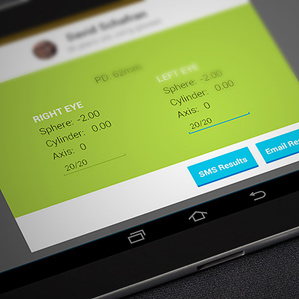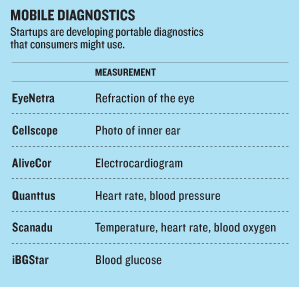When Smartphones Do a Doctor's Job
A simple, cheap way to measure eyesight may face resistance.
- By Antonio Regalado on September 13, 2013
Why It Matters
Much of what doctors do could be automated.
Part of our Business Report:
A Cure for Health-Care Costs
Health-care spending is out of control. Can technology save us money?

Eye app: A smartphone displays a measurement of the refractive error of a person's eyes.
Vitor Pamplona isn't a doctor. He's not even an optician. He can't write you a prescription for glasses, or sell you a pair. Still, he's pretty sure he's going to disrupt the $75 billion global eye-care market.
At EyeNetra, the startup he cofounded, goofy curiosities like plastic eyeballs line the shelves, and a 3-D printing machine whirs in the background. It's printing out prototypes of a device that will attach to your smartphone and, in a minute or two, tell you what kind of eyeglasses you need.
The device, called the Netra-G, is based on some clever optics and software Pamplona came up with—a way to measure the refractive error of the eye using a smartphone screen and an inexpensive pair of plastic binoculars. The whole setup might cost a few dollars to make. It does the job of a $5,000 instrument called an autorefractor.
More important, just about anyone could use it. That's where the disruption comes in—and the trouble. Right now, only doctors or optometrists can prescribe glasses or contact lenses. Pamplona, a brash Brazilian programmer who arrived in the U.S. a few years ago, thinks that won't always be the case. "We're changing medicine by providing the user the right to measure themselves," he says. "We see doctors as more of a coach."
Mobile phones are giving rise to a new class of clip-on diagnostic devices that could challenge doctors' monopoly on diagnosing disease, not just errors in vision. Since doctors' fees account for over 20 percent of U.S. health-care spending—and fully 3 percent of the country's GDP on their own—such devices could potentially slash costs as well.

EyeNetra has received more than $2 million in financing from the outspoken Silicon Valley investor Vinod Khosla, who last year antagonized doctors by calling what they do "witchcraft" and predicting that 80 percent of their work diagnosing and prescribing could be done by machines.
Khosla's investment fund is also backing several other similar ventures, including AliveCor (see "Your Heartbeat on an iPhone"), which sells a heart monitor that attaches to an iPhone, and Cellscope, a company developing a phone camera that could let parents diagnose a child's ear infection (see "Parents Could Skip the Doctor's Office with This Device".)
... more deleted
--
sent from samsung galaxy note, so please excuse brevity


No comments:
Post a Comment